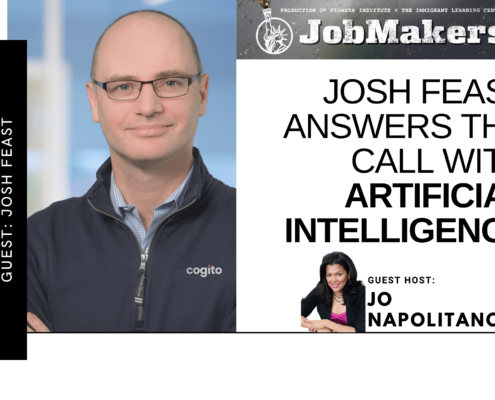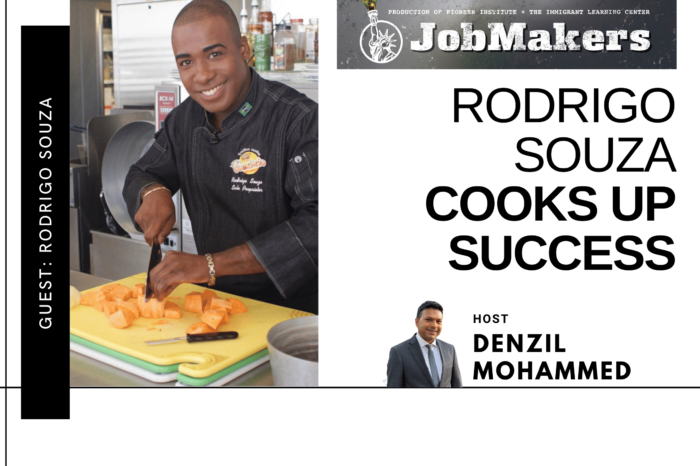Rodrigo Souza Cooks Up Success
/in Economic Opportunity, Featured, JobMakers /by Editorial StaffThis week on JobMakers, host Denzil Mohammed talks with Rodrigo Souza, immigrant from Brazil and owner of Comeketo Brazilian Steakhouse in Leominster, Massachusetts. Drawing on the resourcefulness and doggedness of his Brazilian culture, Rodrigo built a successful business here in the United States, creating around 400 jobs since his restaurant opened in 2009. Offering rodízio-style service, Comeketo won the People’s Choice Award in the 2020 Worcester, Massachusetts Best Chef Competition. Even during the pandemic, Rodrigo found new and inventive ways of generating revenue and keeping people employed. He’s also given back to the country that took him in, from his three years in the U.S. Army to feeding the town’s homeless, as you’ll learn in this week’s JobMakers.
Guest
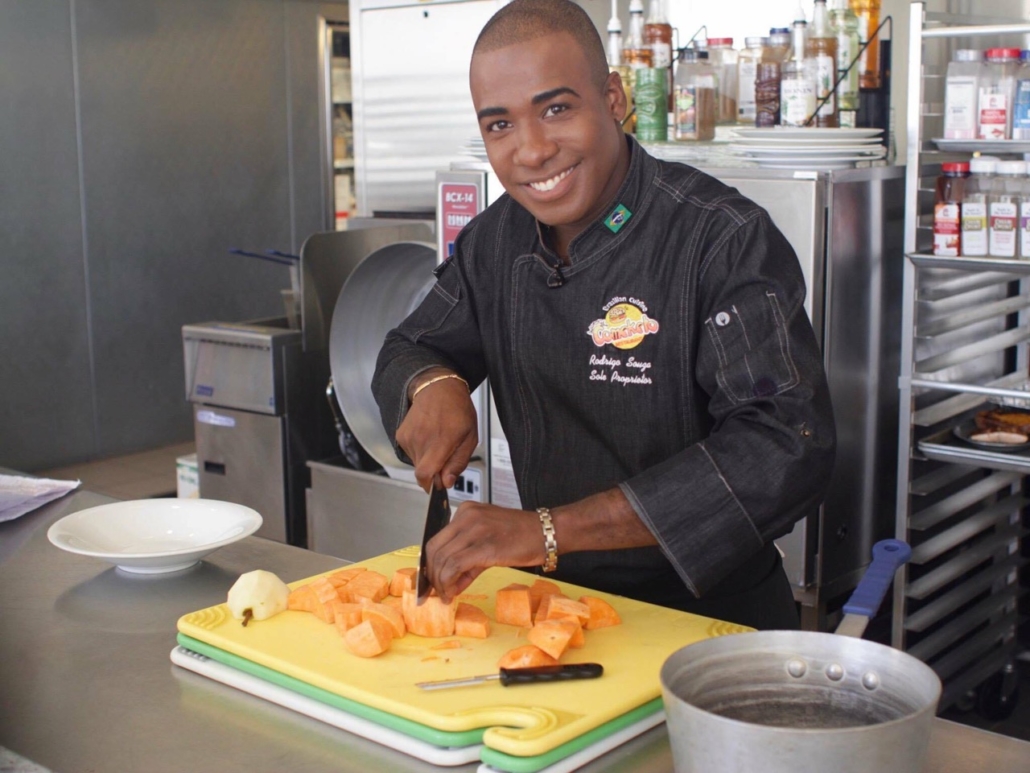 Rodrigo Souza is an authentic, natural entrepreneur. Born and raised in Rio de Janeiro, Brazil, Rodrigo immigrated to the US in September 2001 at the age of 18. During his early days in the U.S., Rodrigo found his passion for the food and hospitality business. He began his career at Vinny Testa’s preparing silverware for guests and quickly advanced to the front of the house to become a server. His entrepreneurial nature kicked in and he opened Comeketo restaurant in Leominster in 2009. Within five years, he moved to a larger location, which he later renovated to become a full-service Brazilian Steakhouse. During his career, Rodrigo has served the U.S. Army for three years and devoted many hours to his local community. He is currently a member of the board of the Massachusetts Restaurant Association.
Rodrigo Souza is an authentic, natural entrepreneur. Born and raised in Rio de Janeiro, Brazil, Rodrigo immigrated to the US in September 2001 at the age of 18. During his early days in the U.S., Rodrigo found his passion for the food and hospitality business. He began his career at Vinny Testa’s preparing silverware for guests and quickly advanced to the front of the house to become a server. His entrepreneurial nature kicked in and he opened Comeketo restaurant in Leominster in 2009. Within five years, he moved to a larger location, which he later renovated to become a full-service Brazilian Steakhouse. During his career, Rodrigo has served the U.S. Army for three years and devoted many hours to his local community. He is currently a member of the board of the Massachusetts Restaurant Association.
Get new episodes of JobMakers in your inbox!
Read a Transcript of This Episode
Please excuse typos.
Denzil Mohammed:
I’m Denzil Mohammed. And this is JobMakers.
Denzil Mohammed:
Fun fact: in the greater Boston area, more than one quarter of immigrants from Brazil I 27% are self-employed more than any other group. That means they are more likely to be job makers, go to ilctr.org to learn more. For Rodrigo Souza, immigrant from Brazil and owner of Comeketo Brazilian steakhouse in Leominster, Massachusetts, the resourcefulness and doggedness in Brazilian culture followed him to the United States and enabled his success. He estimates he’s provided around 400 jobs since his restaurant opened in 2009. And he’s so popular even in a county that’s 75% white, that he won the people’s choice award in the 2020 worcester, mass. Best Chef competition. It wasn’t always easy. And even during the pandemic, when restaurants were really hard hit, Rodrigo found new and inventive ways of generating revenue and keeping people employed. He’s also found ways to give back to the country that took him in, from his three years in the US Army to feeding the town’s homeless. As you’ll learn in this week’s JobMakers. Rodrigo Souza from Leominster, Massachusetts, welcome to JobMakers. How are you?
Rodrigo Souza:
Amen. Thank you. Thank you. I’m good. I’m good. Thanks for having me.
Denzil Mohammed:
So you are the owner of Comeketo, Brazilian steakhouse in Leominster, MA. Give us the 30-second pitch about your business.
Rodrigo Souza:
Okay. Comeketo is a Brazilian steak house and we offer people a very unique experience than other Brazilian steakhouses, which is basically to try everything on the menu. We have a variety of different meats anywhere from pork, chicken, lamb, steak, sausage we do also grill pineapple on a rotiserie with a variety of different sides, salads. So coming here, it’s really like going to a tasting.
Denzil Mohammed:
How did you end up in this business? I remember you saying that your mom didn’t even cook, right?
Rodrigo Souza:
Yeah, my dad did not come from a family that likes big cooking or anything like that. My mom actually hates cooking, but you know, I grew up being an only child and I actually got to learn how to do some stuff when I was young, but I never actually really had on my radar that I would do something like that for a job, you know, for a career. When I came to the US, my cousin worked in restaurants, so it’s actually a funny story, cuz I used to go pick him up every night. In the beginning I didn’t have a job and I would fill out an application every time I would go pick him up. And then the general manager said, you cost me more money in applications. I’m just gonna hire you. So they actually made up a position for me, which is like a roller. So I would sit in a corner of the dining room and make roll ups all night long, you know, fork, knife and the napkin. Those are real roll ups. You get when you go to restaurants, I’d do that from like four o’clock until like 10 30, 11. And that my hands are like smooth from so much friction with the napkins all day, all night.
Denzil Mohammed:
So you sort of fell into it and is not something uncommon. I remember interviewing Shane Smith from Hugh O’Neill’s Irish pub, sort of the same thing, you know, he just sort of fell into it and it was something that was, he decided to bring his heritage to America in this way. In his case it was Ireland, and in your case, it was Brazil. So this takes us back to your roots in Rio de Janeiro. What was like life like growing up in Rio?
Rodrigo Souza:
Growing up in Rio, it’s a very, very good experience, man. Actually one of the reasons why I’m here in the US is because I was having a really, really good time in Rio de Janeiro. So my parents kind of deported me from <laugh> Brazil to here. Growing up, being real, you know a lot of fun, a lot of partying, a lot of friends, a lot of good times.
Denzil Mohammed:
So you said your parents wanted you to get away and discover the world. So 2001, you moved here at the age of 18 to Boston. Why did they want that for you? And what was the experience like of moving to a place where the language and the culture and the laws and everything was so different?
Rodrigo Souza:
Well they wanted me to experience something different. They wanted to take me away from my friends and they put a good offer in front of me in terms of coming here. Everybody, you know, has a dream to come to America, right. Even though I did have a good life in Brazil, it wasn’t because I was really seeking for a better life like that. But you know, they wanted me to learn English. They wanted me to learn the culture, they wanted me to create other relationships, create other links you know, and maybe do something better with my life than I would have in Brazil, that opportunity, et cetera, you know?
Denzil Mohammed:
And so your first job was was working in restaurants.
Rodrigo Souza:
My first job was actually working in a supermarket here, Roche Brothers and it’s it’s funny cuz this town, I don’t know if you’ve ever heard of Millis it’s exit 19 off of 495, I think. And I was the only immigrant, I was the only Black person in the town, you know. Actually when I went to high school, it was kind of like, “oh, this guy is from Brazil,” <laugh> this, guy’s from Brazil, you know? And that was my first job doing bagging atRoche Brothers.
Denzil Mohammed:
Wow. Yes. I’m actually familiar with it, it’s not the most diverse town in Massachusetts. So you opened Comeketo in 2009 and you’ve grown significantly since then. I mean, you started out as basically a sandwich shop and now you’re a full-service restaurant. I know it wasn’t easy. In the beginning, you actually had to borrow money just to fill your cash register to have change. What was that experience like, starting this as someone who didn’t have a business before?
Rodrigo Souza:
Let me correct you. Okay. It wasn’t easy. It’s still not easy. <Laugh> it’s never easy. It’s never easy. The first, you know, I scraped all the money that I had, which wasn’t a whole lot to you know, to start this business. And then the first day we didn’t have money in the register to you know, put it. So I actually borrowed 50 bucks from somebody and I basically gave that money back at the end of the night. But that if you’re talking about being unprepared, you know, we can have a conversation because I just really saw the first step of the whole set of stairs. I just saw one step. I put my foot in there and kept on going up. But by no means, I wanna say that, you know, we are super big right now, but we definitely in a better position. We’ve grown a lot. We developed a lot. We went from like a seven table sandwich shop, you know, to you know, 85seat restaurant full-blown, Brazilian steakhouse that’s being able to you know, expose to this community here what Brazilian food is, Brazilian culture and et cetera.
Denzil Mohammed:
What do you think was in you? What qualities do you think you had, you said you sort of had to mature and get seasoned in this in order to be able to be a successful entrepreneur. Do you think you have particular qualities that allows you to take that risk and start this business?
Rodrigo Souza:
The qualities that I think helped me to get me where I am today is that I’m very persistent. I’m very persistent. I usually and I heard this from some other person it’s not me that created this, but “persistence beats resistance,” persistence beats resistance. So you know, sooner or later, man, you swing that bat so many times, you know, enough times that you’re going to hit the ball. You’re going to hit the home run. I actually recently did the Ironman. Three months ago, four months ago, I did an Ironman competition, I actually still have the the band.
Denzil Mohammed:
Oh, wow.
Rodrigo Souza:
You’re supposed to take this off after you’re done. I kept it because I want to remind myself of the things that, you know, like what takes to get to the finish line, not necessarily finish line, but you know, to get to other levels. And I did this because I wanted to, you know, I knew that these would help me in other areas of my life. You know? It’s a constant battle between your mind and your body and in life. It’s you, your mind is trying to screw you all the time. Your mind is trying to put you in a safe place all the time. Your mind doesn’t want to hurt you, you know? So you can’t listen to your mind like that all the time. Otherwise you never do anything significant with your life. Cause your mind wants to protect you.
Denzil Mohammed:
I was gonna ask you what advice you would have for budding entrepreneurs, but I think that’s it right there, you know, mind over matter and, and just being persistent. Yeah, of course. Now we are in a pandemic and restaurants were really badly hurt. You had to come up with new revenue streams. What were they? And do you think they’re sustainable going forward? Or
Rodrigo Souza:
I, I, I get a, you know, like thankfully, like we actually have pulled through this. Okay. We had to be very creative. We actually doing the pandemic. We turned the restaurant into a little mini supermarket, so online. So we actually sold, you know, every, all the food that we buy, you know, we sold it online, delivering these items to people. And you know, this was about 30% to 33% of all revenue during the pandemic. Another creative thing that we did was we created some virtual brands. So we have right now, we still actually have five virtual restaurants. So we created these brands, we market ’em online and everything comes out of here. You know, it’s very short menus, you know, 5, 6, 7 items. It’s a good way to capture a bigger market share in their community and use the same ingredients that you’re already using here. You don’t have to buy a whole lot, but that’s a couple of things that we did and have done to stay relevant and keep bringing, you know, the revenue we should in order to survive and keep people employed.
Denzil Mohammed:
That’s incredibly creative. Would you recommend this kind of branching out an additional revenue streams to other businesses in other industries?
Rodrigo Souza:
Absolutely. I actually, from this, I actually created another company called virtual kitchen hall, which we actually, we actually sell in this concept, we selling this concept out, but for, for, for lack of a, you know better term and and not having the enough time to explain what really is, well, just think as a franchise, you know, we we, you know, sell these idea out to all the direct across the nation now, and they execute these menus out of their own kitchen. And what we do is we market those menus in their area. We give them a printer and a tablet and people order and comes right in their kitchen with dispatch a driver to go out and get the food. They don’t have to do anything. All they have to do is fulfill the order. And that’s a great way to bring, you know, $500, $700 sometimes even more a day in sales. So you already have your infrastructure there. You already have your, you know, people, you already have your inventory there. You know, you know, why not maximize on the space that you have?
Denzil Mohammed:
Wow, that’s great. In 2020, so again, during this pandemic, you said people have been supporting us all these years and now it’s our turn to support them. One of the initiatives that came out of the pandemic was “my local, Massachusetts.” How do you think this has helped the local economy where you are?
Rodrigo Souza:
I believe it certainly did during the pandemic. We reached out to a couple families that were in need, you know, we gave out some groceries. We actually had some people reach out, reaching out to us to also you know, buy people, some groceries and whatnot. We currently help out an institution here called “our father table every six weeks or so, there’s a rotation of restaurants to actually give them food, you know, cook them a nice meal, et cetera. So we, we try to do a part.
Denzil Mohammed:
A business order for well over 10 years now, do you think that it’s important to give back?
Rodrigo Souza:
I think it’s absolutely important to give back. I think that the concept that the Bible has to give 10% of your earnings, you know applies anywhere, you know? So it’s definitely important to look at your life, look at your self and extend a hand to somebody that’s in need and try to help somebody, you know, giving them something, but also teaching them how to do their on their own as well.
Denzil Mohammed:
So according to our own research here at the immigrant learning center, immigrants from Brazil in the greater Boston area are the most likely to be self-employed of all the other immigrant populations in greater Boston. Well, 27% start their own business, whether it’s incorporated or not incorporated. Why, why is it that Brazilians like to start their own businesses and create jobs? Whoa, what is it about about that?
Rodrigo Souza:
<Laugh> Brazilians find ways to do things, you know, better than most people, I guess. I think one thing about Brazilian people, man, I think we are very resourceful. I consider that’s another thing about the quality or virtue being an entrepreneur, I’m very resourceful. You know, for example, I started Comeketo out of nothing, man, you know, like what are the chances of somebody starting something, knowing that they don’t have the money to start, they don’t have the money to put in the register? You know, like you find ways to do things. And that’s, like I said about swinging that bat, you know, you swing that bat enough times, you find people that want to help you. You find ways to do things.
Rodrigo Souza:
For example, when I moved from the, my older, old location to this location, you know, it was okay. Sort of smooth transaction transition. And then when I renovated the place that I’m in, you know, and I turned into a Brazil stake house, we did a full blown renovation here and in my calculations in my projections and things like that, we would spend a about $50,000. And I didn’t know that I had that money. I didn’t know I had $50,000 and that’s another crazy thing that I did. Some people call this being inconsequent, but I called that the will to excel. I only had $7,000 in the bank and I had an idea of how generate the money for the construction while, while the construction was happening. So I basically,you know talked to everybody that was doing the project with me and I tried to negotiate something like 30% now, 30 when it’s done . You know,like after, you know, I started like bringing revenue.
Rodrigo Souza:
So we actually, we sold a ticket to the grand opening, a couple different days as a show, we brought some Brazilian dancers, you know, the samba dancers. And we turned it into a show, like almost a movie theater, you know, like a five o’clock session, 7:30 and a nine o’clock. And so I sold a good amount of tickets for that. So as the ticket sales are coming, I put that back into the construction it was a crazy move, but you know, and this construction started at $50,000 and cost me like $85,000. This is just to show, I have done a lot of things like that in my life that I didn’t have the means to do it. I didn’t have the resources, it didn’t look like I could do it, but I believed in myself, and you know, I pulled through.
Denzil Mohammed:
So finally, you, you mentioned earlier that being back in Brazil, you know, everyone wants to live in America and this American dream, and a lot of people who, who are born here don’t have as optimistic of you, of, of the American dream. Do you think that the American dream is alive and well?
Rodrigo Souza:
I think there’s, there’s definitely alive. You get, look for it. You get every day you get, look for it every day. You know, every day you have to look for it every day, you get a knock on doors, right? Every day you get a knock lock. Where’s my dream. Is it here? <Laugh> right. Again, it goes back to you know, being persistent, believe yourself. I’m definitely thankful that I came to this amazing nation. And it has really taken me in. It’s not gonna come and knock on your door, that’s for sure. You know, it’s not gonna come to you. You gotta go to it. You know, that’s just how it is.
Denzil Mohammed:
That that’s a really good point. It’s not just going to present itself to you. You’re gonna land in a street paved with gold.
Rodrigo Souza:
No, at all. Not at all. Not at all. You have to,
Denzil Mohammed:
You have to actually pound the street.
Rodrigo Souza:
It tastes better when you actually, you go after like that, you know?
Denzil Mohammed:
Oh, wow. I’ve never heard anyone describe it like that. That’s incredible. Rodrigo Souza of Comeketo Brazilian steakhouse in Leominster, Massachusetts. Thank you for joining us on JobMakers.
Rodrigo Souza:
Hey man. It was my pleasure. It was my pleasure. Thanks for having me.
Denzil Mohammed:
Jobmakers is the weekly podcast about immigrant entrepreneurship and contribution produced by Pioneer Institute in Boston and the Immigrant Learnings Center in Malden, Massachusetts, a not for profit that gives immigrants a voice. Thanks for joining us for this week’s incredible story. Got comments, questions, or know someone we should talk to? Email Denzel, that’s D E N Z I L @ jobmakerspodcast.org. Next week we’ll have a special episode on new research showing that our outsized contributions of immigrant essential workers that kept the US going through the pandemic – and the policies that ignored them. Join me next Thursday for another Jobmakers.
Related Posts
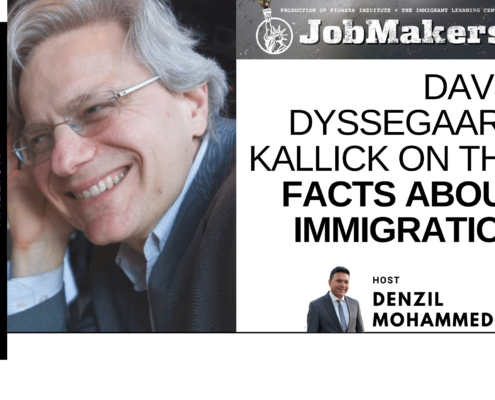
David Dyssegaard Kallick on the Facts about Immigration

Ely Kaplansky Goes from Immigrant to Inc. 5000 Insurance Entrepreneur
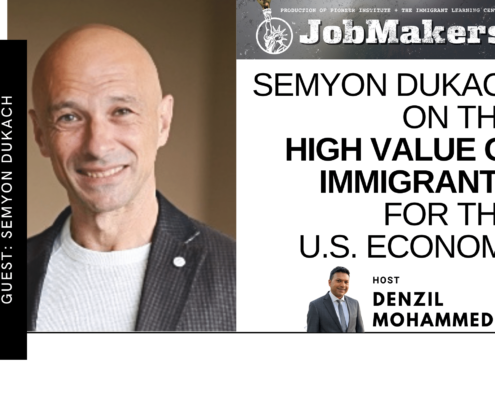
Semyon Dukach on the High Value of Immigrants for the U.S. Economy
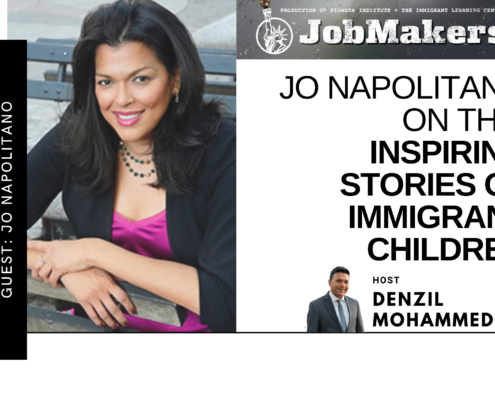
Jo Napolitano on the Inspiring Stories of Immigrant Children

Umesh Bhuju Seeks a Fair Deal for Immigrants, Farmers & the Environment

Dr. Babak Movassaghi on Winning in Football & Healthcare Innovation

Jitka Borowick on Starting a Small Business during COVID
